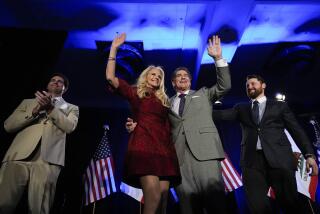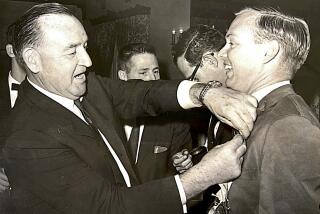Taking the Politics Out of Elections
California Secretary of State Kevin Shelleyâs resignation was depressing. By the time he made his announcement on Friday, multiple criminal and legislative investigations were underway, looking into charges that he rewarded the son of a campaign supporter with a job, that he spent federal money (earmarked to help California run its elections) for partisan political purposes and that he created a hostile work environment.
But Shelleyâs departure may also offer an unexpected opportunity, if Californians have the good sense to take it -- a chance to diminish the role of partisanship in our election system and to make the system better, stronger and fairer.
Under the law, Gov. Arnold Schwarzenegger is entitled to appoint someone to fill the rest of Shelleyâs term, subject to the normal confirmation process in the Democrat-controlled Legislature. Schwarzenegger naturally would like to give this plum job -- which includes overseeing state elections, special elections and ballot measures and certifying presidential election results -- to a fellow Republican. (Shelley is a Democrat.) That would give the GOP a leg up on campaign-related decisions as election season approaches and would give the party an acting secretary of state who could run for the office again as an incumbent in 2006. Democrats have tried to pressure Schwarzenegger not to make a partisan appointment -- and Republicans have, in turn, accused them of playing politics.
But neither side, frankly, is in the right. A better path for the governor and the Legislature would be to take politics out of Californiaâs election administration entirely. After all, it is a peculiar American phenomenon that the chief elections officer in many states is chosen through a partisan election.
Such partisanship raises, at the very least, the appearance of a conflict of interest. Think of the controversies surrounding Katharine Harris, the Republican secretary of state who also was George W. Bushâs Florida co-chair during the 2000 presidential election debacle. This past election season, there were also controversies over discretionary decisions made by secretaries of state and other partisan election officials in Missouri, Ohio and New Mexico -- all battleground states whose votes were crucial in determining the outcome of the presidential race.
The fundamental question is one of trust. Ever since the Florida controversy in 2000, trust in the system of election administration in this country has plummeted. Even electronic voting, which was once touted as a technological cure-all to the âhanging chadâ problem caused by those notorious punch-card machines, is now mired in controversy over security and the possibility of computer hacking.
Under the circumstances, what we need is an independent, neutral professional to serve as the chief elections officer of this state. The model should be that of Alan Greenspan, not Katharine Harris, and the goal should be to make it easy for every eligible California resident to vote and have that vote correctly recorded and counted in a system that guards against voter fraud.
How can California move to a better system? Itâs not enough to make the election of this official nonpartisan; thatâs a pretty meaningless reform, as weâve seen elsewhere in the state. Nor is it enough to make Californiaâs chief elections officer an appointed position: Thatâs what has been done in Florida, and the Republican governor there appointed a reliable Republican to the position, continuing controversy over Florida elections.
Californiaâs Constitution should be revised so that the chief elections officer (who may or may not be the secretary of state) is appointed to the position for a fixed term of, say, 10 years. He or she should be nominated by the governor and approved by a 75% majority of the Legislature. Such a supermajority requirement would ensure that only a consensus candidate who could achieve broad support from both parties would be chosen for the office. The Constitution should also guarantee some independence for the budget of the office and provide that the chief elections officer can be removed only through a difficult impeachment procedure.
In addition, the Legislature should pass tough conflict-of- interest provisions. Shelleyâs predecessor, Republican Bill Jones, generally did a good job as secretary of state. But almost immediately after leaving office he went to work as a paid consultant for a manufacturer that was selling electronic voting machines to California counties.
In the short term, the governor and Legislature should appoint a competent, neutral administrator (such as an experienced county registrar of voters) to the position. Longer term, the special election that the governor is expected to call for June provides the perfect opportunity to make these changes. Free and fair elections are the hallmark of American democracy. But they depend upon public faith in the process.
More to Read
Get the L.A. Times Politics newsletter
Deeply reported insights into legislation, politics and policy from Sacramento, Washington and beyond. In your inbox three times per week.
You may occasionally receive promotional content from the Los Angeles Times.










